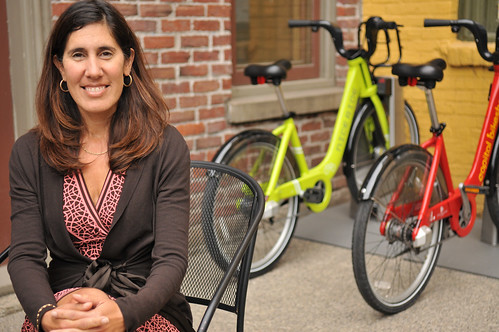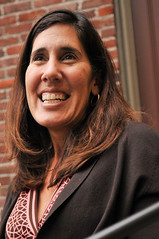
(Photos © J. Maus)
On the day her company won the contract to operate what will be by far the nation’s largest bike share system, Mia Birk held a small celebration in the courtyard behind her office in Southeast Portland. Birk, who’s tenacity and vision helped lay the foundation of Portland’s bikeway network in the 1990s (and became subject of her book), was beaming as she and colleagues took a moment to let the news sink in.
“So many cities are going into this like bike share is an extra, a fluff thing, but New York City is saying ‘no, this is a significant pillar of our transportation system’.”
— Mia Birk
As announced yesterday, Birk’s company, Alta Bicycle Share (which was founded three years ago as a spin-off of Alta Planning + Design, of which Birk is CEO) will partner with New York City’s Department of Transportation on a 10,000 bike, 600 kiosk system with an estimated price tag of $50-60 million.
The Alta Bicycle Share team spent six months on the winning proposal. Birk says the victory is a game-changer, not just for her Portland-based company, but for bike share and urban bicycling in general.
“It’s game-changing for our nation to have New York City jump into bike-sharing because it’s such a large city and they’re going to do it right and on a very large scale,” she shared with me during a chat yesterday. “So many cities are going into this like bike share is an extra, a fluff thing, but New York City is saying ‘no, this is a significant pillar of our transportation system’.”
Birk said the new system will be a vital “fourth leg” of New York City’s overcrowded transportation network that already consists of an excellent transit system, a burgeoning bike network, and sidewalks brimming with people on foot.
Bike share in New York City is expected to rack up one million rides in its first year, gobbling up the 22 percent of trips that are less than one mile and the 46 percent of trips that are three miles or less (stats which Birk rattled off without hesitation).
Birk sees the bike share decision by NYC DOT as just the latest sign that they are taking the bold steps necessary to make dramatic shifts in the car-centric status quo that plagues big American cities. “Just like they’ve done with cycle tracks, I think New York City has that kind of moxie, that kind of courage to say, we’re going to do it right, it’s going to be challenging, it will require some tradeoffs, but we’re there.”
As we spoke, Birk exuded her usual confidence and satisfaction that comes from a career built on doing big things in a field she loves; but there was also a sense that the unprecedented size and scope of the New York City contract will come with daunting responsibilities.
Birk estimates she’ll hire about 200 people in New York City alone just to handle daily operations of the system. That will more than double the 120 staff Alta Bicycle Share currently has spread across their other systems in Washington D.C., Melbourne, and Boston. (The Portland office houses the finance, software, planning, communications, and logistics staff.)
“It’s a huge challenge,” she shared, “Staffing up to that level in a city where there’s a lot of media attention, a lot of lawyers, a lot of humans, and a lot of politics… It’s clearly a very big risk and a big challenge.”
But, in a tone that many who have met Birk will recognize, she added, “But the exciting thing is, we’re up for it… We are determined to do everything we can to create a more bike and pedestrian friendly world and we’re willing to take risks to get there. We believe you have to take risks to be successful.”
For a sense of how the New York City contract changes Alta Bicycle Share, consider this. The company currently operates about 2,500 bikes and 220 stations across their three systems. New York City Bike Share’s 10,000 bikes and 600 stations will balloon those numbers and will make Alta the leading bike share company in North America (at this point they don’t really have any competition*). “It’s a big step up in our level of responsibility.”
For Birk, the silver lining is that Alta is growing quickly in an economy where good news is rare. “We’re trying to be a bright light in a dim economy. It’s a great moment in terms of our growth.”
Birk was referring to her company when she said “our growth,” but it’s not hard to see how the New York City project will set growth in motion in other ways as well.
(*B-cycle could qualify as Alta’s competition, but the two companies’ business models are different. B-cycle is focused on selling their bikes (made by Trek) and kiosks, while Alta is a full-service operator that provides bikes, kiosks, (which they purchase from Bixi in Montreal) and all the back-end services.)


